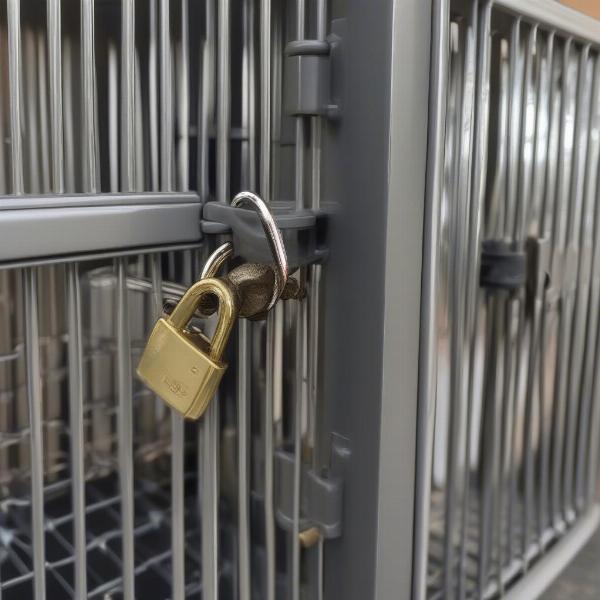Choosing the right lock for your dog’s cage is a crucial aspect of responsible pet ownership. A secure lock not only prevents escape but also provides peace of mind, knowing your furry friend is safe and contained when necessary. Whether you’re crate training a puppy, managing an anxious dog, or simply need a secure space for your pet during travel, understanding the different types of dog cage locks and their benefits is essential. Finding the perfect lock can be the difference between a stressful experience and a secure, comfortable environment for your dog.
Types of Dog Cage Locks and Their Uses
There are several types of dog cage locks available, each designed with specific features and benefits. Understanding these differences will help you choose the most appropriate lock for your dog’s cage and your individual needs.
Spring-Loaded Latches
These are the most common type of cage lock and are often found on standard wire crates. Spring-loaded latches are easy to operate with a simple push or slide mechanism. However, they can sometimes be less secure, especially for determined dogs who might be able to paw or nudge them open. These locks are generally suitable for calm dogs who are not prone to escaping.
Bolt Latches
Bolt latches offer a higher level of security compared to spring-loaded latches. These locks use a sliding bolt mechanism that is more difficult for dogs to manipulate. Bolt latches are a good option for dogs who are known escape artists or those who experience anxiety in their crates.
Gravity Latches
Gravity latches are designed to automatically lock when the cage door is closed. They rely on the weight of the door to engage the locking mechanism. While convenient, gravity latches might not be suitable for all dogs, especially strong or particularly anxious ones.
 Gravity Latches for Dog Crates
Gravity Latches for Dog Crates
Padlocks
For maximum security, consider using a padlock in addition to the existing latch on your dog’s cage. Padlocks provide an extra layer of protection, making it virtually impossible for your dog to escape. This is particularly useful for travel or situations where your dog might be unsupervised for longer periods.
Choosing the Right Lock for Your Dog
The best type of dog cage lock depends on several factors, including your dog’s temperament, the type of crate, and the specific situation. For puppies and calm dogs, a simple spring-loaded latch might be sufficient. However, for dogs with a history of escaping or anxiety, a more secure option like a bolt latch or padlock is recommended. Always ensure the lock is sturdy, durable, and properly installed to prevent any accidents.
Importance of Secure Dog Cage Locks
A secure dog cage lock is essential for several reasons:
- Preventing Escapes: A properly functioning lock keeps your dog safely contained within the crate, preventing them from wandering off and potentially getting lost or injured.
- Safety During Travel: When traveling with your dog, a secure crate and lock are crucial for their safety and comfort.
- Managing Anxiety: For dogs who experience anxiety, a crate can provide a safe and secure den-like space. A secure lock ensures they remain in this comfortable environment.
- dog gate indoor Keeping other pets safe. A secure crate can help manage multi-pet households by providing separate spaces when needed.
- Crate Training: A secure lock is vital for successful crate training, ensuring your dog associates the crate with a positive experience.
Maintaining Your Dog Cage Lock
Regularly inspect your dog’s cage lock for any signs of wear and tear. Lubricate moving parts as needed to ensure smooth operation. If the lock becomes damaged or loose, replace it immediately to maintain a secure environment for your pet.
Conclusion
Choosing the right dog cage lock is an important decision that can significantly impact your dog’s safety and well-being. By considering your dog’s individual needs and the different types of locks available, you can ensure a secure and comfortable environment for your furry friend. Remember to always prioritize safety and choose a lock that provides the appropriate level of security for your dog. outdoor dog kennels for large dogs
FAQ
- What is the most secure type of dog cage lock? A padlock used in conjunction with a bolt latch offers the highest level of security.
- Are spring-loaded latches safe for puppies? Yes, for calm puppies, spring-loaded latches are often sufficient.
- How often should I check my dog’s cage lock? Inspect the lock regularly, at least once a month, for any signs of damage.
- What should I do if my dog’s cage lock breaks? Replace the lock immediately to ensure your dog’s safety.
- Can I use multiple locks on my dog’s cage? Yes, using multiple locks, such as a bolt latch and a padlock, can enhance security.
- My dog keeps escaping his crate. What should I do? Consider upgrading to a more secure lock, such as a bolt latch or padlock, and ensure the crate itself is sturdy and in good condition.
- Are gravity latches suitable for anxious dogs? Gravity latches may not be the best option for anxious dogs as they might be able to manipulate them open.
ILM Dog is your trusted resource for expert advice on all aspects of dog care and companionship. We offer comprehensive guides on dog breeds, health, training, nutrition, grooming, and much more. Whether you’re a new dog owner or a seasoned pro, ILM Dog is here to help you provide the best possible care for your furry friend. Contact us today for personalized advice and support at [email protected] or +44 20-3965-8624. Visit ILM Dog for more valuable information on dog care.